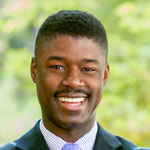Katanga Johnson
Katanga Johnson (MSJ17)
Banking Regulation Reporter, Bloomberg News

Katanga Johnson’s journalism career has taken him around the world. He’s covered human trafficking in Ecuador, politics in Cuba and now, U.S. finance in Washington, D.C. It’s a career he said he discovered thanks to the Medill Washington Bureau.
His time at Medill opened dozens of other doors for him. Between travel opportunities, classes in a variety of reporting mediums and exposure to the Medill alumni network, Johnson said Medill helped him find a job doing what he loved.
Tell us about your career path.
My career journey has been guided by faith. Between the end of my undergraduate studies and pursuing my MSJ degree at Medill, I spent three years reporting in Ecuador about children facing unfathomable circumstances, including recovery from human trafficking and others living with HIV.
Telling those stories blended my studies as a philosophy major and my interest in journalism. My reporting helped increase awareness of the little-known issue and led to many philanthropic fundraising campaigns through a non-profit, evangelical organization, Operation Mobilization. The decision to tell those stories in that specific region of Latin America at that time was a hard but meaningful lesson in how to write about people's emotions, their beliefs, as well as the hard and sometimes brutal facts of social underdevelopment. I was doing what I thought was the right thing to do. The fact that it had an impact was merely a matter of faith. I have taken this same approach in my current role.
How has your Medill training helped you in your career so far?
My Medill training equipped me with the ability to recognize patterns and trends within my beat, especially ones that relate to the way people often respond to news about a subject they may recognize is important, but perhaps don’t fully understand. This creates a demand for my reporting to serve as a nexus between the complex financial regulatory space and the global public interest.
How did the Medill curriculum help you find your niche as a financial reporter?
There is much that can be said about a program that gives you the opportunity to spend twelve months telling stories between different media: an introduction to coding, video storytelling and editing, basic news writing, long-form magazine writing and documentary storytelling. This array of classes exposed me to the technical side of story gathering. Medill encouraged me to try my hand at each of those skills and helped me better identify what makes for a gripping story.
How did the Medill network help you in finding your job?
The team of faculty and staff at the Medill Washington Bureau single handedly put me in direct contact with alumni at several media organizations. My two media practicum experiences helped, too! Just my participation in this part of the program helped increase my chances of finding a job. When I was looking, I brought along my best published pieces from my time in Chicago and my most ambitious reporting ideas that I had in progress.
What is a class or experience that sticks out in your mind and why?
Travelling with the Medill Explores program to Cuba left an indelible mark on my experience at the school. Not only did I appreciate the unpredictable nature of collective reporting projects, I also found the decision of the administration to allow students to report during the highly politicized U.S.-Cuban relationship just weeks after the inauguration of a new U.S. president to be a statement of the commitment to overall student exposure.
What advice do you have for someone considering Medill?
The school augments the level of skills and amount of drive you bring with you. Keep your personal reasons for attending front of mind. Cultivate relationships before you need them. Keep writing. Take time to observe what trends might be going unnoticed in your concentration. Keep shooting and editing. Pursue a few key goals but also explore a couple fresh ones. Keep snooping.

